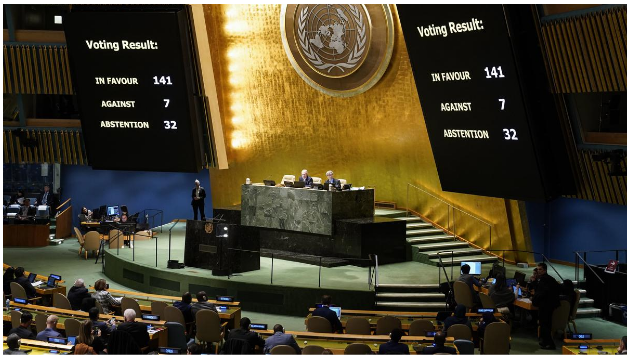Context:
The article analyses the position India has been taking on the Ukraine crisis from the beginning in light of India’s abstention on United Nations General Assembly (UNGA) resolution, calling for an end to the war.
 Image Source: The Hindu
Image Source: The Hindu
| Probable Question:
Q. India’s position on the Ukraine crisis is based on pragmatism unlike opportunistic foreign policies of the West. Analyse. |
India’s stand on UKraine-Russia War & Western Response:
- India’s Stand:
- India did not condemn Russia for the invasion;
- It has refused to join the West’s sanctions;
- It stepped up buying Russian fuel at a discounted price,
- It consistently abstained from UN votes on the war.
-
- India’s position has triggered sharp responses in the West. Many wondered why the world’s largest democracy did not condemn Russia.
- For some others, India was “financing” Vladimir Putin’s war by buying Russian oil.
Contested claim of democracies versus autocracies:
- Western stand on the war: To save global democracy, the rules based order and international law, all democratic and lawadhering states should take a position against Russia and join the western coalition.
- India, Brazil and South Africa have consistently abstained from votes at the UN and refused to join the sanctions — because the sanctions were unilateral, imposed by specific countries or blocs, without UN approval.
- Even some countries that are part of the western alliance system, say Israel and Turkey, are reluctant to join Mr. Biden’s crusade.
- Most of these countries see the war as a European problem between two former Soviet countries with its roots going back to the end of the Cold War.
- For them, it is less about global democracy than the post Cold War security architecture in Europe.
Understanding India’s Position:
Morality versus national interests
- A key dilemma before any country in international relations is that when it comes to specific actions in the event of a clash between moral positions and national interests, it is about which path they should take.
- For the U.S. and much of Europe, there is a convergence of their moral positions and foreign policy objectives in the case of the Ukraine war. The U.S. wants to “weaken” Russia.
- When there was a divergence between national interests and moral concepts, the West, without qualms, embraced the first.
-
- In 2003, the U.S. launched its illegal invasion of Iraq, violating the country’s sovereignty.
- In 2011, the North Atlantic Treaty Organization (NATO) turned a UN Security Council resolution to establish a no fly zone in Libya into a full scale invasion.
- Right now, the U.S. has illegally placed its troops in Syria.
- Israel has illegally annexed East Jerusalem and Syria’s Golan Heights and keeps building illegal Jewish settlements in the occupied West Bank.
- The U.S. has recognised Israel’s annexation of Golan and moved its embassy to Jerusalem.
- While Russia is being pounded with sanctions, Israel is getting billions worth of military aid every year from the U.S.
- Turkey, a NATO member, has illegally seized Syrian territories but faces no international ire.
- India should put her national interest at the core of their policy making. But it does not mean that India should completely side step the moral question.
- India, by no means should help Russia militarily in the Ukraine war.
India’s National Interests:
- Ties with Russia, a historical partner, are important for India in many ways. One is energy — discounted fuel coming in from Russia is a relief for India.
- Russia has fulfilled over 46% of India’s defence needs in the last five years. Diversifying sources of defence imports away from Russia would take time.
- Russia is deepening its ties with China. India should retain its leverage over Russia through existing ties.
- Russia plays a key role in India’s continental foreign policy. To manage its continental interests and tackle its continental security concerns, India has to work with powers in the Eurasian landmass where the U.S. is practically absent, especially after its disastrous withdrawal from Afghanistan.
Conclusion:
- Neither the weakening of Russia nor the destruction and splintering of Ukraine is in its interests. India wants an immediate end to the war and a new security equilibrium between great powers so that the global economy could be stabilised and the world could focus on more pressing problems — from climate change to UN reforms
- India should stick to its pragmatic neutrality, rooted in realism, and continue to push for a practical solution to the Ukraine crisis.
News Source: The Hindu
![]() 3 Mar 2023
3 Mar 2023
 Image Source: The Hindu
Image Source: The Hindu